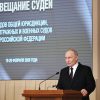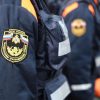 Adam Ahmed fought back tears as he recounted his escape from deadly violence in Khartoum. Photo: Henry Bodkin
Adam Ahmed fought back tears as he recounted his escape from deadly violence in Khartoum. Photo: Henry Bodkin
A former British bus driver who was forced to flee Khartoum without his wife and son, feared for his safety on Thursday evening as a ceasefire was established at midnight.
Adam Ahmed found himself cut off from his loved ones, who were trapped in a very unstable part of the city, meaning he could not take them with him on an RAF rescue flight.
This is one of the countless families torn apart by recent violence and a cease-fire that seems to have never come into effect in parts of the Sudanese capital.
Speaking from the safe airport of Larnaca in Cyprus, he told The Telegraph: “It is very difficult to move from one place to another [in Khartoum]. You can just lose your life.”
Evacuation from Sudan
Despite desperate diplomatic efforts, the country appears to be descending into all-out violence on Thursday, prompting a warning from the foreign minister that further evacuations may be possible. be «potentially impossible».
As the ceasefire drew to a close, African countries and the United States tried to negotiate an extension, even as airstrikes and anti-aircraft fire were heard in Khartoum and the nearby cities of Omdurman and Bahri.
The short window has been critical to the British evacuation operation, now in its third day, which has so far allowed the airlift of 900 of its citizens from Sudan to Cyprus, with about half of them repatriated to the UK
Two evacuation An RAF flight landed in Larnaca, Cyprus on Thursday, and more are expected in the evening and later in the night.
Ministers urged those remaining in the conflict-torn country to take advantage of the opportunity to fly out in the final hours. about a ceasefire.
“It is time to move because when the ceasefire ends, my ability to give the limited assurance that I can give now may be gone and we will not be able to evacuate,” said James Cleverley, Minister of Foreign Affairs.
Hundreds of people have been killed in the capital Khartoum over a nearly two-week conflict between the army and rival paramilitary forces — the Rapid Support Forces (RSF) — with the two sides involved in a power struggle that threatens to destabilize the region as a whole.
Timeline of the conflict in Sudan
The apparent success of the British evacuation operation was, however, overshadowed by a diplomatic spat on Thursday, when the German defense minister publicly criticized the UK for its mission to evacuate British diplomats over the weekend.
>
Boris Pistorius said that by doing so without proper authorization, the UK angered the Sudanese army by temporarily withdrawing landing permits, delaying other countries' evacuation plans.
Downing Street said it would not acknowledge the claims, at the time as the Ministry of Defense described them as «complete nonsense.»
According to a senior political source in Berlin, the decision to land at the Wadi Seidna airbase without permission caused «surprise». «It wasn't exactly professional,» a source told The Telegraph.
Evacuation missions from Germany and elsewhere were then disrupted for several hours as angry Sudanese authorities withdrew landing permits, the source said.
It is not correct to suggest that the UK's efforts to evacuate embassy staff from Sudan last weekend slowed down. German plans,” Prime Minister spokesman Rishi Sunak said.
We worked very closely with each other. with our French, American and German partners.”
But a source in Berlin told The Telegraph that the events first reported by the BBC happened «without a doubt».
60-year-old Ahmed worked as a bus driver in Bedfordshire. In 2014, he returned to Sudan to farm.
His wife Magil and son Ahmed are trapped in northern Khartoum, but trying to track them down was a potential death sentence.
“I feel very bad,” said the 60-year-old man, holding back tears. “Fighting is going on in this part of the city. It is very difficult to move from one place to another.
«I'm in touch with them, but sometimes there's no signal or internet.»

The Sudanese army made it clear that could go along with African and American proposals to extend the 72-hour ceasefire.
On Wednesday, the army said its leader, General Abdel Fattah al-Burhan, gave initial approval to plans to extend the truce for another 72 hours, and also sent army envoy to the South Sudanese capital Juba for talks. p>
The RSF issued a statement accusing the Army of attacking their forces and spreading «false rumors» without citing the proposal.
Despite intense diplomatic efforts to renew it, some British passport holders who have achieved security Cypriots were caustic about the ceasefire.
Nader Omar, an emergency doctor, said that the bodies literally accumulated near his house.
“They kill each other in front of our house,” said He. “The corpses lie on the street.
“The situation is ugly, very bad – no water, no food. We had no choice, we had to leave.”
But as further proof of the stalemate the violence has placed families in, his wife Maha said: “My mother is disabled and still in Khartoum, and my brother and sister.
«We need to contact her, but we can't get through.»
Another family, 63-year-old Kamal Hashim, an aircraft technician in the RAF Valley in north Wales, narrowly missed a waiting RAF transport plane at the Wadi Saidna airstrip.
When trying to leave Omdurman, he, his wife and three daughters were caught in the crossfire in a battle between rival forces.
 Kamal Hashim was able to escape from Odurman with his wife and three children. Photo: Henry Bodkin
Kamal Hashim was able to escape from Odurman with his wife and three children. Photo: Henry Bodkin
“It was very close,” he said. “You can see how they shoot at each other, and we are driving in the middle.
“They,” pointing to Lena, 7 years old, Ahmed, 9 years old, and Danya, 15 years old, “were very scared.”
In the House of Commons, James Cleverly defended the advice of the Ministry of Foreign Affairs to citizens who found themselves in the country .
He said it was better to give general advice on how to get through the Sudan to the evacuation point, because specific advice could become outdated very quickly and put recipients at risk.
“The travel advice we provide is to increase the safety of British citizens abroad and not put them at unintentional risk.
“And there is often a lag – there is a lag between how we get the information, how we broadcast that information and across we are taking action on this information, and one of the things that we have seen, not directly due to the advice given by the UK, but because of the advice that other governments have given, is that they have inadvertently put people in more dangerous circumstances, and these people are under attack, so we must give general advice.»
«You hear gunshots everywhere»
In Cyprus, British passport holders who made it to safety shared stories of terror and accidents.
Elfatih Abdelrahman, 61, a Manchester-based business owner and father of five, was also skeptical of ceasefire.
Describing his flight from Omdurman to the airstrip, he said: “We were afraid because at any moment they might tell you to stop, and if you don’t, they might shoot you.” . /p>
«Fortunately, we were told each time to just keep moving.
«You hear gunshots everywhere, even when we were at the air base, we heard gunshots from outside in the distance.»< /p>
Meanwhile, Giles Lever, the British ambassador to Sudan, has been transferred from London to Ethiopia to lead diplomatic efforts to end hostilities in Sudan, the Foreign Office said.
Mr. Lever, who is not was in Sudan when the violence broke out, worked at a crisis center in London.
























































Свежие комментарии